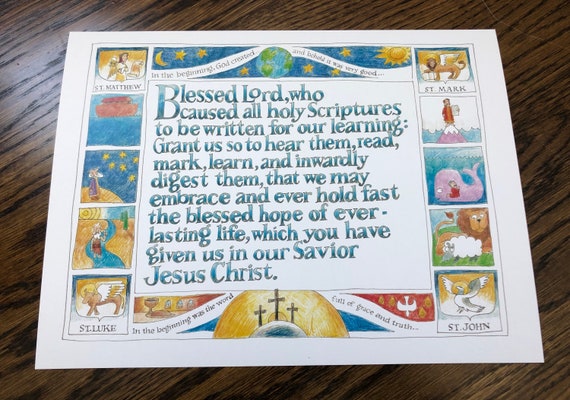I heard a teacher say that pastors spend more time reading about the Bible than reading the Bible. Ouch. That was not only hard to hear, it was pretty accurate. If that is true of pastors, could it be true of our people as well? Have we trained ourselves as pastors and therefore trained the people in our care to read more about Scripture than Scripture itself? As a pastor it is hard to read Scripture as Scripture and not read it professionally always looking for a sermon handle or a quick authoritative answer to a question or a prospective Bible study. Is that an attitude we have passed on to our people?
The conservative Protestants put us Lutherans to shame in their overall knowledge of Scripture. In part it is because they read the Bible -- the whole Bible and not just bits and pieces. I have to admit it came late in my ministry that I first encountered a Bible version without verses or chapters or center reference columns or notes on the bottom of the page. At first I found it strange but also somewhat compelling. In the end it was really quite liberating. Imagine, to read the Bible as one text instead of verses -- some more important to my need, vocation, or interest. It makes me wonder about the value of the study Bible or the way we tend to study the Scriptures. Are we too focused on specific texts to the point where we do not read or know or are even interested in the rest of Scripture?
Everyone wants to study Revelation or jump into the controversial texts but are we saying that some Scripture is more important than others? Have we decided something that God did not say? Has the Bible anywhere said there are texts of varying importance and we need to concentrate on the more significant ones? Does not Jesus say that all of Scripture points to Him, reveals Him, and is fulfilled in Him? We say that the Law, the Prophets, and the Writings all testify to Christ but we routinely skip or omit the historical books over the prophetic, the texts we have decided are Messianic over the ones we have decided are not, and the texts we have labeled cultural or set in a time over those that are objective and forever. It is as if we are saying this Word of God is not important or relevant or necessary.
Lutherans do this all the time with respect to the hobby horses of our own tradition (justification by grace, Law and Gospel, etc.). I understand why. These are the formative things of our history and identity and major emphases within the Word of God -- so I get why we do it. Does that mean that what we are doing is right? Is there something more to Romans than chapter 3? Lutherans are not the only ones who do it. Some chose the sovereignty of God as their lens on Scripture and others choose other things. Lutherans are certainly not alone in this. Even Rome has its particular texts that it uses all the time while others languish. But I fear that this has become so normative that we do not know the Scriptures; we only know specific texts.
The three year lectionary certainly gives us a broader exposure to Scripture and may help but the lectionary was never meant to be the only Scripture the people of God heard nor was it meant to convey the whole of Scripture. Reading the Bible with the Church is not simply reading the lectionary -- although it certainly includes that. It means being acquainted with the Word of God as the whole Word of God -- the full story of God's work and the full revelation of His will and purpose. An exposure to Scripture from a daily devotional or from what is heard in the Divine Service is certainly not bad and is salutary but knowing these does not mean we know Scripture -- we know bits and pieces.
I guess what I am urging is that we not only study books or topics but actually make time and find time to read the whole Word of God. A setting of Scripture without verse numbers or chapter designations or references may be a help to this. If you have not done this, do it at least once in your life. It may actually encourage you to read the Bible this way more than once.

1 comment:
That was always the complaint when I was in seminary (Baptist: (. : We spent too much time studying about the Bible and we didn’t know what the Bible actually said. Of course, in Baptist seminary, we would have missed much that is true, LOL.
Post a Comment